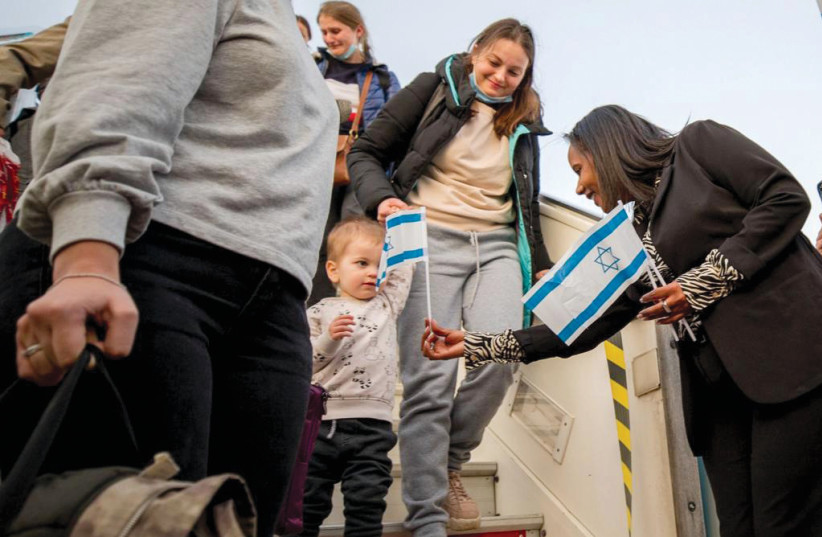‘It was early in the morning when my father woke me up. He told me that we were going to escape our village in Ethiopia that night to begin the journey to Israel. He told me that I was to go to the market and buy a pair of shoes, a jug for water and a shovel. When I asked him why we would need a shovel he said, ‘Not all of us will make it.’”
I was sitting on a bus in Gondar, Ethiopia, as I heard that story. The only sound came from the bus hitting rocks on the dirt road. I was there with 60 Jewish leaders from North America on a mission sponsored by The Jewish Agency for Israel and The Jewish Federations of North America. We were there to show our support for Ethiopian Jewish community members still yearning to be reunited with their families in Israel. The next night, we accompanied 200 new Ethiopian immigrants on a chartered flight to Tel Aviv.
Just six months earlier, I found myself in a not dissimilar situation on a flight accompanying 180 Ukrainian Jews to Israel. This was in the weeks after the Russian invasion and the refugees had escaped to Budapest. As the flight readied for takeoff, I saw a young woman crying as she Face-timed with a young man in a Ukrainian military uniform. Although I do not speak their language, it seemed like he was trying to comfort her and express how happy he was that she was flying to safety in Israel.
In 2022, Israel will welcome a greater number of new olim than it saw during any year since the fall of the Soviet Union. This year has seen more immigrants from Ukraine, the former Soviet Union and Ethiopia than the worldwide total (a little over 28,000) in 2021. Bear in mind that 2021 was a year of substantial aliyah because of the number of prospective immigrants who had delayed their plans due to COVID-19 in 2020.
What is the differences between the to aliyot?
Having now traveled with both Ukrainian and Ethiopian Jews, I have found myself reflecting on the differences in the experiences of these two aliyot. To be sure, there were many similarities. They were both escaping wars and were also incredibly reliant on a people whose language they did not speak. There were tears on both occasions and mothers on both planes grabbed their children’s hands tightly.

But there were two main differences.
First, simply put, the Ukrainians were sad to depart and the Ethiopians were overjoyed. This is, of course, not surprising. For Ukrainian Jews, the decision to move to Israel happened in moments. All men ages 18-60 were not allowed to leave, making this an Aliyah wave of women, children and the elderly.
These are, by and large, a people who had every opportunity to move to Israel before the invasion but like me had chosen to live their lives somewhere else. Many of them appeared to be people of means who had lost everything in an instant and were now on a journey to a country that they had never visited. To be sure, they were grateful beyond words but they were also terrified.
In contrast, many Ethiopian Jews had been waiting for over two decades to come to Israel. Several told our delegation that they had siblings in Israel whom they had never met. Jerusalem for them is more than a place, it is the stuff of dreams. As my Jewish Agency colleague, Sigal Kanotopsky, told me about when she was a little girl in Ethiopia and a bird flew away, she would shout up to it “carry words of peace to our holy city of Jerusalem.”
The second difference is more complicated. When I looked at the Ukrainian refugees, I saw myself. Like me, they lived a fully Western lifestyle and their clothes and pace of life mirrored my own. For months after meeting with them, I have had the same thought: this could happen to me. These people were living in a developed country as doctors, lawyers and consultants, and one day woke up to discover that their apartment walls were shaking and their safety was very much in danger.
On the other hand, the Ethiopian Jews come from a world that most of us could never contemplate. They live in abject poverty, and in fear of civil war and oppression. A visit to the market carries the risk of rape and even murder.
Amid this perilous situation, they have not chosen to assimilate into other communities for safety. They have not tried to hide their identities. They go to synagogue, wear Stars of David and sing songs of Jerusalem they learned from their parents. And they wait, some with suitcases that have been packed for decades.
These men and women are Zionists to their core. From leaving key family members behind to walking for miles in a scorching hot desert, the sacrifices they have made and continue to make in order to be Israeli are remarkable.
As I do on nearly every trip to Israel, I visited the Western Wall before leaving. As I touched the ancient stones, I thought about the new olim beginning their first full day in Israel, those who are still waiting and I thought of those who never made it. Mostly, I thanked God that Israel is there for all Jews, regardless of our color, background or whether the decision to make Aliyah was sudden or years in the making. No matter where we live or who we are, we are privileged to live in a world with a Jewish state and we can never take it for granted.
The writer is head of North America at The Jewish Agency for Israel, and the president and CEO of Jewish Agency International Development.
